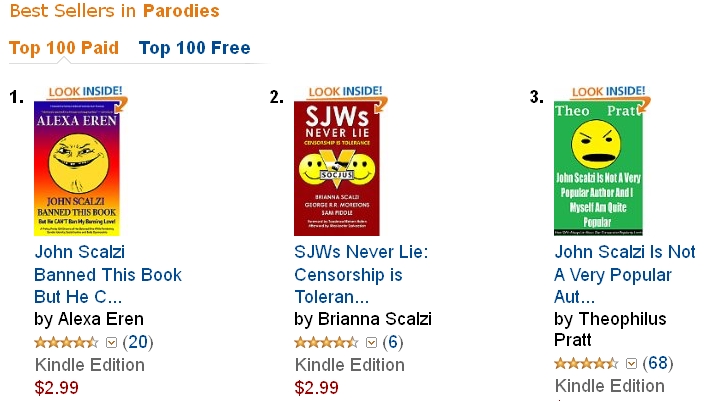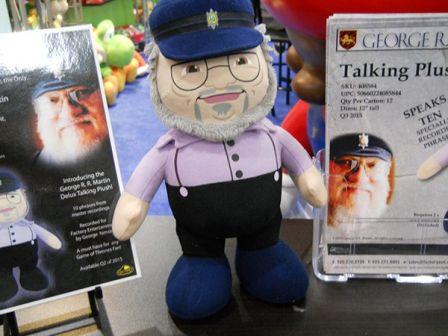(1) Digg has the best space images from the month of August. They are beauties.
As we tediously while away our days down here on Earth, satellites are zooming through space, snapping incredible pictures of Earth, the solar system and outer space. Here are the highlights from August.
(2) Answer just 4 questions, and the William Shakespeare’s Star Wars Sonnet Generator will create a unique 14-line love sonnet just for you!
What Is Lovely As A Summer Slate
Based on the William Shakespeare Star Wars series by Ian Doescher
When sorely press’d by Sith-like enemy,
I think on thee, and soon have no regret.
My heart is lock’d, yet thou dost hold the key,
Our lives are join’d in lovers’ sweet duet.
Let us unto Naboo, its shores of green,
There meet the call of passion at our best.
If thou wert droid, I’d love thee, though machine
If thou would claim mine heart, I’ll not protest.
Love, like a lightsaber, one’s heart can slay,
Love is the new-grown fruit sprung from the heart,
Love plunges one headlong into the fray,
Love is the canvas, passion is the art.
Let rivals come, who chase me at the rear,
Thou hast e’er been my solace, dear.
(3) Radio Times learned nothing from Christopher Eccleston about Doctor Who in a recent interview.
When asked if he’d been watching his successor Peter Capaldi onscreen recently, Christopher Eccleston replied in the negative – in a pretty big way.
“I never watched Doctor Who when I was a child,” he retorted. “I never watched MYSELF as Doctor Who!”
(4) Pat Cadigan on Facebook
After recent events in which Bryan Thomas Schmidt did a solid for both me and everyone else working on MACII, I’ve had some thoughts:
Whatever else happens on social media, on websites, in review columns, on Amazon, or anywhere else, I want a kinder, gentler worldcon.
Worldon is our annual gathering of the clans, not a field of combat. We go there to enjoy ourselves and to be among friends. For a few days, we get to hang out on Planet Science Fiction/Fantasy.
Worldcon is *not* a battlefield.
This is not to say that those with opposing perspectives can’t have a meaningful, even spirited dialog. But there’s a big difference between a heated discussion between people who feel strongly about their respective positions and gladiatorial combat in the Colisseum for the lurid amusement of people who didn’t even bother to show up and in fact never intended to.
I don’t care what your point of view is; I don’t even care if you don’t like *me*––you’re welcome at MACII and I will do nothing to make you feel like you aren’t. But worldcon isn’t a passive, static thing like a department store. Worldcon is interactive (worldcon was interactive before it was fashionable)––what you get out of if, for the most part, is what you put into it. If you go to the panels, check out the dealers’ room and the art show, meet some writers or artists or other pros at kaffeeklatsches, literary beers, or signings, go to the bid parties, and make a little effort to meet new people, you’ll have a great time…
(5) Can you tell this book by the cover?
https://twitter.com/andrhia/status/639482703772024832
(6) Tom Knighton gives his “Thoughts on Sad Puppies 4”.
For most people, the idea of tens of thousands voting for the Hugos should make you giddy. For us, it has added benefits of rendering any small group influence on the awards non-existent. No, our favorites may not win, but you know what? That’s life. What we want to see win is the stuff the actual fan–the people that [George R.R.] Martin may dismiss but who buy books by the truckload–actually reads.
While Martin doesn’t think it will add to the prestige of the award, more fans voting on them will do one thing from my perspective. We’ll start to see some books win that actually look interesting and then deliver on the inside. With the exception of Three Body Problem (which I haven’t read yet, so I’ll give it the benefit of the doubt), that hasn’t been the default position of the Hugos in some time.
(7) Spacefaring Kitten on Spacefaring, Extradimensional Happy Kittens – “My first (seven) reactions to the surprise announcement of Sad Puppies 4”
4 reasons to pet the Puppies:
- Tone
The Puppy organizers Kate Paulk, Sarah A. Hoyt and Amanda S. Green have written things that I consider stupid, hateful and obnoxious, but the Sad Puppies 4 announcement was phrased very un-obnoxiously. Civility is a nice thing.
- It’s not a slate, really
Listing more works than one can nominate for the Hugos and stating up front that one should read the stuff before suggesting it are good and play down the slate aspect.
- No more shady correct taste comissars
With Sad Puppies 3, Brad Torgersen had a somewhat similar nominee suggestion phase (that had humorously few participants). After that, though, he ditched most of the stuff people had suggested and went on with the things that were written by his chums. There will be no more of that, it seems.
- Focus on MOAR
The Puppy trio has promised to focus on participation instead of ideological screeds. It remains to be seen if that is a promise they are able to keep.
(8) Barry Deutsch – “Don’t Be Fooled – Kate Paulk’s Kinder, Gentler Sad Puppy Slate Is Still A Slate”
For instance, in 2012 (before the puppies), 611 Hugo voters turned in ballots for short stories. The most popular short story, E. Lily Yu’s amazing The Cartographer Wasps and the Anarchist Bees, was listed on only 72 of those 611 ballots (about 12%). At least 60% of those 611 ballots didn’t vote for any of the top five nominated stories.
And that’s fine. That’s how the Hugo nominations are designed to work. 611 Hugo voters, acting as individuals, each nominate whatever short stories they think are award-worthy. From that list of hundreds of short stories, the five most-nominated make it to the final ballot.
Unfortunately, it’s an easy system to game, as the Puppies have proven. If you can form a voting bloc of just 100 people who will nominate an agreed-upon list, instead of voting as individuals, that’s enough to completely overwhelm the much larger number of Hugo voters who are voting as individuals. 100 people voting for just 5 works will beat out 500 people voting from among hundreds of works.
(9) Philip Sandifer – “Weird Kitties: An Organized Anti-Slate For The 2016 Hugos”
The good news is that there are five thousand of us, united, if nothing else, by the facts that 1) We voted in the Hugos, and 2) We are not Puppies of any stripe. We are not a campaign. We are not a political movement. We are not playing some elaborate game of four-dimensional chess in order to topple Christendom. Indeed we, in the sense of “me and everyone reading this,” are not even all five thousand voters. But nevertheless, we are a bunch of fans defined by the simple fact that we’re eligible to nominate things for Hugos next year, and we’re not Vox Day’s pack of rabid dogs.
One of the most helpful things, then, would be if all five thousand of us nominated, and if we nominated a full ballot. Among us, we’ve got 25,000 open slots on our ballots in every category with which to push a work over the slate-busting threshold of 541. That’s doable, but it’s also hard. A lot of us, myself included, don’t identify five eligible Hugo-worthy items in every category in a normal year’s reading. In many categories, a lot of us don’t identify one. We don’t all have writing Winds of Winter to be distracted from, after all. And we could use some help.
So I’m creating Weird Kitties for exactly that. It’s going to be an ongoing conversation about awesome science fiction and fantasy that’s come out and is coming out in 2015, conducted for people who want to fill in their Hugo ballots with things they love.
(10) Camestros Felapton – “How big should the Hugo Awards”
What is the ideal number of people to vote on the Hugo Awards? I’d say it should be around whatever the number of people is that feel they can make a reasonable decision on the least popular story category (Novelette? I haven’t checked historically) – i.e. how many people are taking an active interest in SF/F Novelettes published in English in a given year. I don’t know what that number is but those are the interesting people. Why? Because they are people looking at newer writers and people doing interesting things and who are interested in trends etc.
(11) John C. Wright – “Hugo Controversy Quiz Questions”
Theodore Beale, who writes under the pen name Vox Day, joined us as an ally, but disagreed with the goals. He thought the award could not be salvaged and restored to its former glory; indeed, the only thing that could be done would be to force the politically-correctness faction (which he calls by the mocking title Social Justice Warriors, at one time their own name for themselves) to reveal their true purposes. His plan was to make it clear to any honest onlooker that the awards were being given out not based on merit, but due to politics. For this reason, he promoted his own slate of suggested works for his fans to read and vote upon, called the Rabid Puppies.
The Social Justice Warriors did in fact react precisely as Mr Beale predicted, and after the Sad Puppies unexpectedly swept several categories in the nominations, the SJWs used their superior numbers to vote NO AWARD into that category rather than give the award to whichever work was most worthy among the candidates.
This was done purely and openly for political reasons. The mask is torn. No honest onlooker can doubt the motive of the Social Justice Warriors at this point, or ponder whether the claims made by the Sad Puppies were true or false.
(12) Sarah Mirk of Bitch Media interviews Ann Vandermeer in “’Sisters of the Revolution’ Collects Powerful Feminist Sci-Fi”
I was wondering what you think of the “puppies” pushback to the Awards and what that reveal.
Well I have to say I was really excited at the people that won. The best novel category, I was very, very excited about that, because I know both the writer and the translator, so that was—I mean the way that I look at the outcome of the entire awards ceremony is it was showing you that science fiction is bigger than just the United States and the U.K. That’s how I felt. The science fiction community is definitely making that outreach into the wider world. When you think about the Hugos, what you’re looking at is a popularity contest in a sense because the awards are going to be voted on by the people that buy the memberships. It’s plain and simple. It’s not a juried award, there’s no judge, it’s just who’s voting and how they’re voting. So it’s just by the numbers. When you look at it that way, the thing that was really exciting to me is that this past year they had more than double the average number of people voting than they’ve had in the past. I think they had close to 6,000 people who voted.
Did more people turn out to vote because they’d heard about the controversy over the awards?
Well, I think people were getting more involved in the discussion. If you take a look at the numbers, and you look at the number of people who are actually members of World Con, every single person who signs up for a membership, whether it’s supporting or attending, can vote. So, typically, only half of the people that have memberships, vote. Only half. It’s kind of like when you take a look at our Presidential elections, what’s the percentage of people that vote? Not everybody. But we had so many people that actually voted. Now, here’s the good thing about that. It’s not true for every voter, I’m not naïve, but a lot of voters went in and read the stories, which to me is amazing. So a lot of those stories got a larger audience than they ever would.
(13) Didact’s Reach – “So what now, Hugo?”
The detailed statistics behind the awards results showed very clearly that the voters at WorldCon and Sasquan were perfectly willing to undermine the legitimacy of their own award process in order to keep out those that they don’t like. LTC Tom Kratman, John C. Wright, Steve Rsaza, a number of Baen authors, and Toni Weisskopf herself, were all denied awards that they richly deserved and should have won for their respective categories.
Yet, instead of even bothering to consider the alternatives, five different categories were given “No Award”. The Hugo and Nebula Awards were, essentially, reduced to a farce. And all because politics overruled etiquette, courtesy, wisdom, and good judgement.
The SJWs who currently control the nomination and award process have made it perfectly clear that they intend to amend the (already incomprehensible) rules for next year’s ballot in order to prevent a similar uprising from happening again. Good luck with that; I have every reason to think that the Sad Puppies leaders for next year, Amanda Green, Kate Paulk, and Sarah A. Hoyt, will simply adapt, react, and overcome in order to get works by actual skilled authors that fans actually might want to read up for nominations.
(14) Jed Hartman on Lorem Ipsum – “Why I love the Hugos”
I acknowledge that the system is contentious and complicated and initially confusing, and I’m sad that people feel excluded, because I want everyone who’s interested to feel like they can be part of it. In general, I feel like bringing more people into the process means that the awards are more valid, because they’re less likely to represent the views of only a few people.
And there’s a whole lot of room for expansion. Even though I agree that the financial barrier to entry is high, that’s certainly not the only issue, because every year a large percentage of the Worldcon members who are eligible to vote don’t do so. So it’s great that the nominating and voting numbers have been going up and up in recent years, but there are still a lot of people who could vote but don’t, and a lot of other people who want to but can’t.
But even so. Despite all of the system’s flaws; despite my eye-rolling when an MC yet again does the “I’m going to make this ceremony last as long as possible” schtick; despite occasional bad behavior on the part of an MC or a presenter or a nominee; despite my personal disappointment that the magazine I edited for twelve years hasn’t yet won one (I’ve wanted a Hugo since I was a kid); despite the sometimes-contentious arguing about what should be nominated and what should win; despite my dubiousness about making nominees sit there tensely waiting to find out whether they’ve won, and about the basic idea of declaring one particular work or person to be the “best” of the year; despite everything—the Hugos are important to me.
And I especially love the Hugo ceremony itself, in all its disparate parts. The pause to honor the people in our field who’ve died over the past year, as their names scroll by on the screen. The awards honoring contributions to fandom, like the Big Heart award. The occasional very entertaining MCs. The beautiful designs for the Hugo award base. The passing-along of the Campbell tiara. The delight of most of the winners. The sometimes gracious and sometimes funny and sometimes overwhelmed acceptance speeches. The rush to analyze the stats afterward. The whole thing, flaws and all. It’s one of my favorite things about Worldcon, which is (despite its flaws) one of my favorite conventions.
(15) Robert Bevan on Caverns and Creatures – “Hugo Loss (Sad Puppies Can Eat a Dick.)”
- What do the Sad Puppies see as the problem?
SJW, the all-too-often abbreviated form of the “Social Justice Warrior”. It’s most often used as a lazy means for bigots to dismiss opinions which differ from whatever they were told by their daddy/preacher/grand wizard.
Having said that, I will admit to being annoyed by people I perceive as SJWs (in the derogatory sense) as well. In fact, they were an entry in my Reviewers Who Can Eat a Dick post right up until the final edit. I ended up removing that entry because I felt it made me sound like a whiny asshole, and because it’s so hard to differentiate an actual advocate for social justice, which is something that I admire, from an obnoxious loudmouth who’s only interested in scoring sensitivity points by pretending to be offended by innocuous words. (If enough people read this, I’ll get a few comments calling me a misogynist, in spite of the SJW nature of this post, for using the phrase “Cry like little bitches.” in the above entry.)
The puppies’ stated problem was that these SJWs had already compromised the integrity of the Hugos by voting along the lines of authors’ race, gender, sexuality, or politics, rather than based on the quality of the actual books they were voting on. Books with “messages” and meaning were winning out over good old-fashioned fun space romps, like the kind Puppies like to write.
That last sentence is paraphrased from what I read on one of the puppies’ blogs. The implication seemed to be that their books were more deserving of a prestigious award specifically because they were devoid of anything important to say. By that metric, my books should be pulling in Hugos left and right.
(16) Vox Day declares:
John Scalzi can ban all the parodies he likes. The VFM [Vile Faceless Minions] will just publish more bestsellers. Strike one down and two pop right back up to the top of the category within 24 hours.
(17) Scalzi looked over the goods and said…
Jerk: HA THE EBOOK YOU GOT TAKEN DOWN IS BACK WITH A NEW TITLE
Me: (looks; title doesn't falsely accuse me of rape) that's fine.
Jerk: …— John Scalzi (@scalzi) September 3, 2015
(18) Kevin Standlee is working on a proposal to drop some Hugo categories and add others.
I think we’ve reached a point, in small steps, where a significant proportion of the Hugo Award electorate doesn’t know how to actually nominate in at least three categories, and at worst derides those categories because they think they are so complicated or need specialist knowledge that they’ll never have. This is not good for the health of the Hugo Awards. I therefore propose that we should delete three existing categories that people find confusing and unclear and replace them with three new categories that, while not perfectly defined (it’s difficult to define things completely air-tight), are at least more accessible and understandable to the people picking up the ballot or reading the results list.
Categories to Delete
- Best Semiprozine
- Best Editor Long Form
- Best Editor Short Form
Categories to Add
- Best Professional Magazine
- Best Anthology or Collection
- Best Publisher
(19) Andrew Porter writes:
Couldn’t get to Smokane? The smoke made it to the East Coast … by the middle of last week, according to this report. That explains the haze and pollution so many places on the East Coast have been experiencing.
[Thanks to Andrew Porter, Steven H Silver, Mark, Barry Deutsch and John King Tarpinian for some of these links. Title credit goes to File 770 contributing editor of the day John Seavey.]













